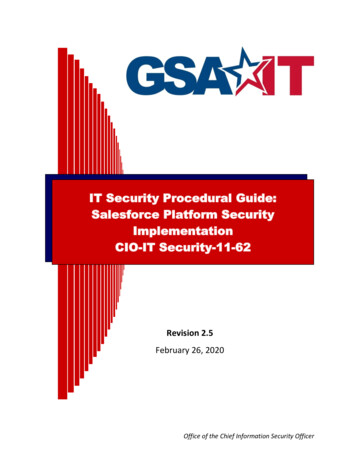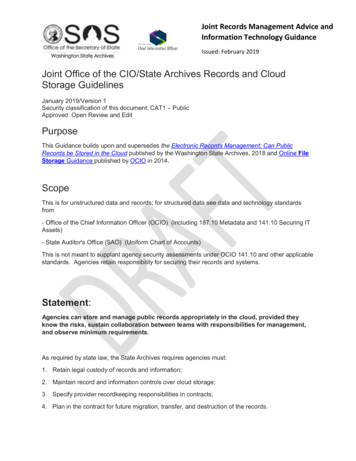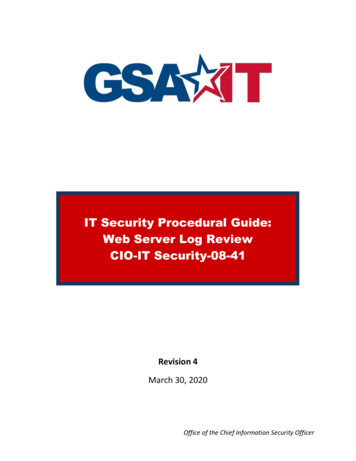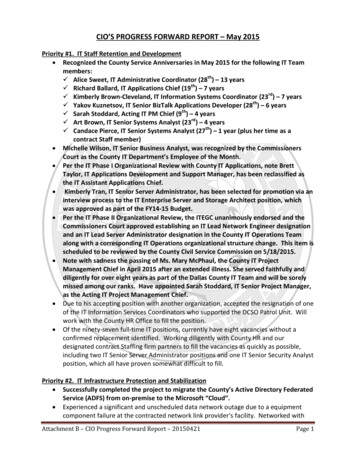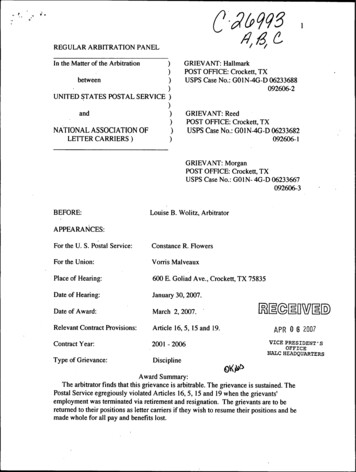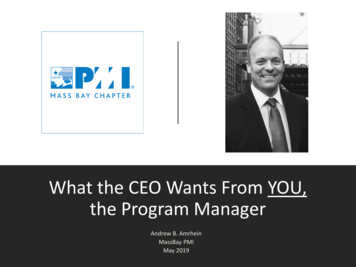
Transcription
What the CEO Wants From YOU,the Program ManagerAndrew B. AmrheinMassBay PMIMay 2019
Agenda What does the CEO want from YOU – the Program Manager Know your business Know your value add Know your profession Practical suggestions in each section Presentation will be interactive – ask questions and add yourown experiences as we go along
Consider .When the CEO has a mission critical program thatjust HAS to succeed .– Why hire YOU as the program manager? . compared with a random passerby? . compared with a PMP certified PM? (Certifications matter.) . compared with an agile certified PM? (Certifications matter.) . compared with a newly minted MS in Project Mgmt? . compared with a consultant?
How Does Your Industry Work?How Does Your Business Work? What does your company produce Who are your customers Who are your competitors How is the landscape going to change?– 5 years? 10 years? 25 years? 18 months What is your company’s strategic advantage? Distinctive competencies?– How does your firm CREATE VALUE?– How are your competitors creating value in the same space?– How is digital transformation affecting value creation in your industry?
How Does YOUR Company Work? What is your company strategy?– 1 year goals? 5 years? 10 years? What are the key roles– Research? Engineers? Sales?– Old: line versus staff – revenue generation versus expense management– New: how to deploy technology for revenue generation Study the company history––––What worked, what didn’t; who succeeded, who didn’tPrior large initiativesCompany investments or acquisitionsMethodology and mindset – “Drucker - The Theory of the Business” How does your company define success and manage itself?
How Does Your Industry Work?How Does Your Business Work? SWOT Analysis, McKinsey 7S Strategic Advantage / Distinctive CompetencyMcKinsey 7-S Framework
Peter Drucker & “The Theory of the Business”vs. Industry 3.0 / Digital Transformation Management techniques come and go . Total Quality Management,Business Process Reengineering, Value Analysis, etc. But these are all related to HOW to do, not WHAT to do Theory of the business – should be clear, consistent, powerful.– But what happens when your business theory changes or is no longer valid? What is the impact of a digital transformation in your business?– Cultural emphasis on agility it’s not just Scrum.– Modern architecture & capabilities (cloud, mobile, analytics,microservices architecture)– Focus on value creation at the edges of your business (horizontallybut also vertically / adjacent). What is your competition doing?– How do you transform core businesses? Think customer serviceand enabling new revenue streams.McKinsey 7-S Framework
What Is Your Company Trying ToDo Right Now? Who is involved? Last quarter results? 2019 outlook and relevant factors?– Do you know these? What is management trying to do?– Increase top line growth? Reduce bottom line expenses? Increase velocity? Expand marketshare? Acquisitions? What efforts are going into Digital? New value & revenue streams?– eCommerce & marketing, agility, cloud, microservices architecture, process automation, predictiveanalytics, big data, machine learning . all leading to new VALUE creation and new REVENUEstreams.– What is your competition doing, and what are adjacent companies doing? Metrics / KPIs - how are managers measured in the company?– Align with this!! People – which people are driving towards the future vs. the past?– Hidden agendas and unwritten rules– Culture, people, movers and shakers, people to avoid
Practical Suggestions! Be willing to learn and ask questions Get Wall St. analyst reports of your company– Your company, industry analysis Check out the financial web sites– Financials, news, company announcements Learn how business works– General business theory, accounting and finance, etc. Learn Digital – it’s coming to an industry near you LinkedIn, Lynda, Podcasts, Online courses Empower your millennials to work on your digital business!
Strategy, Success,and Business Processes How do your work products align with the strategy of your group / division /department?– Understand the line of sight Corporate Strategy Division Strategy and/or IT Strategy Your program deliverables. How does your program’s success demonstrably help your company– You succeed! (On time, on budget, on scope . so what?)– Focus on what is valuable to the company, deliver it well, and constantlycommunicate Key business processes involved– There is no such thing as an IT initiative!– What business processes are involved and what are your impacts?– Are you impacting revenue? Costs? Expenses? Margins? Time to Market? KPIs?
Stakeholder management,results, and value It’s all about the people– How are managers measured in the company and what is your impact?– Who cares whether this program succeeds or fails? Which one do theywant? How is your EQ?– Always be fair, forthright, and build bridges. Be known for integrity.– Focus on the business to win every time."People may hear your words, but they feel your attitude.” - John C. Maxwell Focus on the RESULTs of your work– Find a way to reliably measure your business impact – along the way, ifpossible.– Reduce risk by finding others who did not succeed at similar initiativesand study what went wrong.– Communicate, Communicate, Communicate!!!
Stakeholder Mapping Here’s where you should be like a consultant! Take the time to do stakeholder mapping for any decent sizeprogram (match the degree of rigor to the degree of risk) Like a lot of program management tools and techniques – half thevalue is doing the exercise itself. Steps––––––Identify stakeholdersDocumentUnderstand each stakeholder’s interestsFind the win / manage expectationsPlan and track your actionsPlan to refresh once or twice
Practical Suggestions! Be willing to learn– Realizing you don’t know the answer to all of these questions?– Good! Go ask! Add value to EVERY meeting– Read up on the topic at hand – make sure you thoroughly understand thebusiness you are affecting and how you are making an impact.– Become a mini-expert on the topic. Do a stakeholder map and communicate––––Talk the talk – in THEIR language.Align with who matters. And their subordinates.Get to the point. Executives don’t want all the details unless they ask.Come with 2-3 options for a decision along with a recommendation. Briefkey subordinates in advance.– Know your value add in your sleep, and listen to key stakeholders verycarefully for how they foresee things working in the future (post-program).– Speak truth to power and eliminate surprises.
Be All You Can Be Are you the absolute BEST you can be at your tradecraft?– Do you actually practice your project management profession?– How would an observer know you are a trained projectmanager?– How current are you on project management news / methods/strategies / key players / key events for your profession?– Do you demonstrate management of risk, management ofchange, financial management, schedule management etc. suchthat others can observe it? But don’t become a “PM Propeller Head”!!
Great Program Managers Lead people, and can negotiate, influence, and inspire. Are amazing communicators with strong interpersonal skills anduses those skills to build a strong team and a strong network Are both strategic and tactical (can think big picture AND trackthe details) Are quick learners and use it to develop domain expertise Focus on what is important (think value and business impact) anddo not get caught in analysis paralysis. Think ahead – schedules, risks, budget, resources, stakeholders,customers, etc. Are positive, confident, energetic and enthusiastic and lovetheir job!
Plan for the Future Are you able to manage waterfall projects? Agile? ContinuousImprovement? Lean? Hybrid? . ALL! How good are your IT accounting and finance skills?– Capital versus Expense, Annual Operating Plan / Budgetary Cycle, Feefor Service approaches, Divisional finance approaches The scope for project management has gotten bigger. Projectmanagement is no longer sequestered to IT and increasingly involvingnew business models, agility, new technologies, and new processes. It is critical to challenge yourself to continuously improve your skills –if you don’t keep moving forwards you are sliding backwards. To continue to be valuable, stay up on new processes, new tools, andnew technologies.If you always do what you’ve always done .You’ll always be what you’ve always been.
New Tools, Processes, & Technology ProcessScaled Agile & organizational changes new roles for theprogram and project manager!DevSecOps is about continuous integration / continuousdelivery (CI/CD) and represents further increases inorganizational velocity. As velocity increases, the importance ofunderstanding dependencies and integration management iscritical.Use the tools of the team ToolsCloud-based project management software and collaborationtools have overtaken local-based solutionsEmerging TrendsCloudMachine Learning& Artificial IntelligenceAnalytics Delivers Customer ValueEmotional Intelligence
For Your Career, Consider Home runs come from disruptive innovation and paradigm shifts. Careers arebuilt on this.– These may also be the hardest programs; you want to run towards a program if it iscritical to the business. Consider the value of your time - look for meetings to eliminate from yourcalendar– How much do you talk versus listen? If you’re mostly listening, do you have to bethere? If you are “providing support”, you probably can skip it.– How does the business value of meetings influence your preparation time? Forget human resources. YOU are in charge of your career. Never stop yourprofessional development. Your next job internally or externally – what will it be?– Networking – how active are you?– What experience are you gaining in your current project(s)?"A comfort zone is a beautiful place, but nothing ever grows there.”
Practical Suggestions Sniff out opportunity for delivering real value. There’s one hour a month more valuable than all the rest . probably whereyou were a thought leader and got something done. Maybe something worthadding to your resume. Kick work off of your agenda! Think one step ahead of your management and drive towards solutions.“Whether you think you can or think you can’t, you’re right.” – Henry Ford
IN SUMMARY .
What makes YOU better than someone offthe street? Than a high priced consultant?– Knowing best how to create business value and deliver it. To do this, you must know your business, your company, and your specificvalue add. (And be doing it, and communicating it!)– Communication skills & organizational knowledge. Business and company specific factors (recognizing red flags, etc.) Stakeholders Risks, timing, cultures, etc., etc.– Demonstrated mastery of profession.– Your continuous development & pushing the envelope"Try not to become a person of success, but rather try to become a person of value.” - Albert Einstein
So what does the CEO want fromYOU – the Program Manager?– Know your business– Know your value add– Know your profession
Thank you!!Thank you for attending thisMass Bay PMI event!
Contact InformationAndrew B. ://www.linkedin.com/in/andrewamrhein/
MassBay PMI May 2019. Agenda What does the CEO want from YOU –the Program Manager Know your business Know your value add . Online courses Empower your millennials to work on your digital business! Strategy, Success, and Business Processes How do your work products align with the strategy of your group / division / department?

